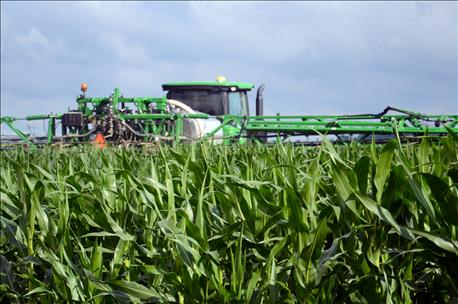
Farmers realize many people in their counties, states and this country don’t understand agriculture. They also believe these lawmakers and policymakers don’t understand how the decisions they make, laws they pass and regulations they put in place can impact both agriculture and farmers in a big way — especially the farmer’s bottom line.
At least that’s how farmers responding to a recent survey conducted by Dow AgroSciences see it. “We call it a ‘pulse’ survey because it’s not meant to be scientific,” says Ben Kaehler, U.S. sales leader for Dow AgroSciences. “Yet we think it’s a good indication of how farmers in general view things happening around them.”

LAWMAKERS WOULD NOT UNDERSTAND PHOTO: Nitrogen is applied at V15 in corn on Aaron and Randy Overman’s farm in Miami County. Farmers don’t think policymakers would understand what's happening in this photo.
A total of 155 farmers were interviewed for the survey, he notes. They were from Midwestern states, with acres farmed ranging from 300 to 2,000. Ages of those surveyed ranged from 35 to 65.
“The results weren’t particularly surprising,” Kaehler says. “However, the percentages of farmers feeling one way or another were higher than what we might have anticipated.
“We know most farmers try to do the right thing, and they believe they do the right thing, but public perception may be different.”
Here are three key findings from the survey.
1. Farmers believe policymakers don’t understand how their actions affect a farmer’s business.
Less than 2% of the farmers surveyed believe that policymakers realize how the decisions they make impact a farmer’s business. That few farmers think policymakers understand their impact isn’t surprising, perhaps. That less than 2% of farmers think this is a strong statement.
2. Strong sentiment exists that policymakers are out of touch with agriculture.
On the flip side of the question, 80% of farmers say policymakers don’t understand the impact of their actions and decisions on a farm business. In any kind of survey, when 80% believe one way, it’s a strong statement, Kaehler says. He says it’s obvious that at least in this survey, farmers believe there is a disconnect between agriculture and policymakers that needs to be addressed.
3. Farmers think policymakers don’t understand agriculture at all!
The case for figuring out how to educate lawmakers and other policymakers grows even stronger after viewing how farmers in this survey reacted to a different but related question. Kaehler says when asked if they thought policymakers understood agriculture, a whopping 85% said, "No!" That’s a big number, even in a survey of this size.

SURVEY SAYS: A recent survey of farmers indicates they don’t believe policymakers understand agriculture, nor the impact their actions have on agriculture.
About the Author(s)
You May Also Like




